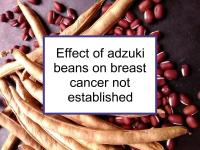Adzuki beans (Vigna angularis or Phaseolus angularis Wight.) or azuki beans, are small beans popular in Japan and other parts of Asia. They are the main ingredient in red bean paste. Bioactive adzuki bean components include catechin, epicatechin, procyanidin dimers, myricetin, peonidin, malvidin, oleanolic acid and protocatechuic acid.
The principal fatty acids in adzuki bean are linoleic acid and oleic acid. Adzuki beans have been shown to have antioxidant, hypoglycemic, antitumorigenesis, and hepatoprotective actions, as well as lowering cholesterol and triglyceride levels. Adzuki bean extracts have been shown to inhibit metastasis of lung cancer and melanoma in the laboratory, as well as inhibiting the growth and proliferation of carcinogen-induced stomach cancer.
Breast cancer-related effects of eating adzuki beans
Very little information regarding adzuki beans and breast cancer is available. The red color and associated anthocyanidins such as peonidin and malvidin found in adzuki beans suggest anti-cancer properties.
However, it is possible that the beans have potentially harmful estrogenic effects. Ethanol extracts of adzuki beans have been reported to increase proliferation of estrogen and progesterone responsive (ER+/PR+) human breast cancer cells. The estrogenic effects of adzuki bean appears to have unique characteristics compared to that of other beans with significant phytoestrogen content.
Adzuki beans also incorporate some copper, which has been shown to increase angiogenesis (new blood vessel formation) and metastasis of breast cancer.
Additional comments
In Asia and Asian cuisine, "red beans" normally refers to adzuki beans, whereas in the Americas "red beans" (in dishes such as Red Beans and Rice) refers to the larger common red dry beans (phaseolus vulgaris). Mung bean paste can be used as a healthier substitute for red bean paste in many dishes.
Note that while we are continually searching for new evidence concerning this food, there is not much interest in it among cancer researchers so few recent studies are available.
